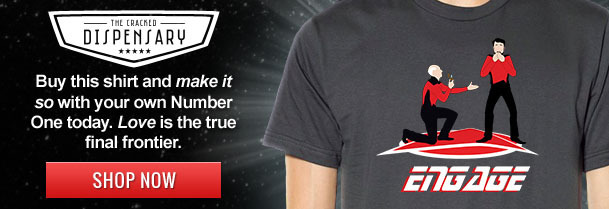6 Ways Stores Go Out of Their Way to Annoy You (And Why)

It's only a slight exaggeration to state that the entire world's economy and the fate of all humankind are based on America's bottomless appetite for buying crap.

"Do these glasses make my GDP look fat?"
So why is it that retailers go out of their way to make the actual practice of buying crap so difficult? The shopping experience is littered with annoying practices and policies designed to turn even the most reasonable person into a shrieking puddle of rage. Here are six of the worst.
(Just to be clear, the people standing on the frontlines of this nonsense war are almost all just working stiffs following company policies. So when you come across any of these practices in the wild, please keep your shrieking rage puddles as tidy as possible. These people don't need your grief.)
"Can I Help You With Something?"
You're reading jokes and facts on the Internet right now, so I'm going to assume you have at least a passing familiarity with being antisocial. Humans are kind of a pain to deal with, so when it's not necessary, why bother? This makes the phrase "Do you need any help with something?" the retail equivalent of hearing a cat dragged across a chalkboard. Honestly, who needs help finding things in the brightly lit store with excellent signage? Even if you did, it's not like help is difficult to find. You're all wearing uniforms, guys.

Although different uniforms do make you more or less approachable.
I know sometimes this is a commission thing, salesmen trying to boost their monthly stats, but it's also common in stores where the staff doesn't work on commission. So why are they up in our grill?
The Reason:
It reduces shoplifting. Retailers can actually scare off some fraction of potential shoplifters just by letting them know that there are employees around with nothing better to do than approach strangers. That's why they go to this effort to try to "touch" every customer that walks into their store.

Not literally.
Your New Television Looks Terrible
Is your first instinct when shopping for a television to go to the store and look at all the televisions there? You know, the ones set up to be looked at? Well congratulations, moron, because little did you know that a television showroom is basically the worst possible environment for comparing televisions.

This is much bett- ... wait no, this doesn't make sense either. Stock photography is weird.
And sure enough, when you get your new, not-exactly-cheap television home, it looks all sorts of crappy, way worse than your friend's television. So what the heck?
The Reason:
First, each television in a store is typically set up to display the brightest, most garish picture possible, simply because that's what's the most eye-catching from a distance. All the finer details of the image get washed out, which are exactly the sort of details you might actually be trying to compare in a side-by-side test.

"Well, Shrek looks brightest on this one, so I guess it's the best."
Second, although every television in a store will typically display the same movie, there's no guarantee that they're all receiving the same quality of signal. The distribution system feeding all those televisions is way more complicated than the 3-foot HDMI cable you'll be using at home and is often a jury-rigged mess of cables with all sorts of opportunities for poor connections and interference. You might end up ruling out a perfectly good television from your search simply because it's at the wrong end of the aisle.

"No, see, this one just displays gray. That's not enough for me. I want one of the ones that can display Shrek."
The Extended Warranty Upsell
So let's say you've picked out your expensive television incorrectly and are ringing it up at that weird little cash register they keep beside the televisions. While there, I can guarantee you'll have something quite similar to the following conversation:
"So, would you like the extended warranty on this television?"
"Why? Is it going to break?"
"Oh, probably not. But this will cover you if it does."
"Do they break a lot?"
"I saw one come in the other day that exploded this dude's whole family."
"Now I kind of don't want to buy this television."

(thinking) "My family hates getting exploded."
So why the hell at this, the most critical, money-exchangingest point in this whole process, would a retailer start talking up all the chances their product could break?
The Reason:
Because for the business selling them, extended warranties are surefire, risk-free investments, a crop of free money just waiting to be harvested off of people who don't understand math. Extended warranties are a form of insurance, and thanks to the power of nerds with spreadsheets, every piece of insurance is designed to, on average, cost the insured more money than they'll get in return.

(thinking) "My family hates nerds."
The only reason you should ever buy insurance is to insure against a disaster that you couldn't possibly recover from on your own savings. House insurance or car insurance or health insurance, that kind of thing. Television insurance, when you call it "television insurance," sounds like exactly as dumb an idea as it is.
The Grocery Shuffle
Once or twice a year, a supermarket will close its doors for the night, whereupon an army of people I can't not imagine as elves appear from the shadows and move every single product around to different shelves. The next day, regular customers are left baffled and lost, straggling through the aisles searching for their wandering groceries. For able-bodied customers, this is a serious annoyance; for the elderly, it seems almost cruel, extending their shopping trips to lengths of up to seven hours.

An almost 50 percent increase.
So why would they seek to confuse and baffle us like that? Aside from their obvious and understandable desire to screw with the elderly.
The Reason:
Confused and baffled shoppers are slower shoppers, and slower shoppers buy more things. If you don't know where to look, you'll have to look everywhere, and that means you'll spend more time looking at things you don't need, but suddenly realize you want.

"Beef jerky and condoms, that's all I need ... oh hey, neat, ranch dressing."
"Can I Get Your Phone Number?"
So there you are, buying something utterly innocuous and undeserving of government monitoring. Not, like, 4 tons of fertilizer or a tank -- socks or something. And then, for some reason, this utterly normal transaction takes an abrupt turn toward the personal when the cashier asks you for your phone number.

"Also, do you mind if I measure your inseam real quick?"
What the hell's going on here? What do they need your phone number for? Are you being asked on a date? Because the cashier is so attracted to the sock money you're throwing around?
The Reason:
Your phone number is valuable information.

Look how serious this guy is. Serious Phone Business is at work here.
At the most basic level, a company will use your phone number as a key to build up a profile of you, which they can use to target their marketing materials. "Ahh," you say, "but they don't have my address." Well, if you gave them your address and phone number some other time, to schedule an installation or something, they do. Or they could simply buy it off someone. All these companies freely buy and sell your personal information among themselves. Your phone number becomes the key that pins together a variety of different databases, which means Safeway now knows about the sex toys you buy, and Mistress Kayla's House of Fists knows about your preference for store-brand peanut butter. When you give your phone number away, the whole planet knows everything about you.

"Hey, check out this guy's inseam. Hahahahhahhahahah."
Christmas Is Too Damned Early
Despite what the lame-stream media will tell you, Christmas really is under threat. From itself. The best parts of Christmas -- the loot, the abundance of chocolates, the gravy-based meals -- are in grave danger of being overwhelmed by all the worst parts of Christmas, like the music, or the shopping.

Also all the time spent with our awful families.
It's the Christmas shopping that really grates, though, casting its foul musk over all the other retail activities we do in the later part of the year -- a part of the year that is rapidly expanding. According to some book called "Bible," the Christmas season officially begins on Advent on November 27, but that custom hasn't been followed for decades, and every few years, retailers seem to push up the start of the Christmas season a little more. First to Thanksgiving, and then to Halloween, and now it's well into October, which is still basically the previous year's Christmas shopping season. There's not a person on the planet who looks forward to Christmas shopping in the early fall -- this is easily one of the most hated trends in retail, and the butt of thousands of jokes. So why do retailers keep doing it?
The Reason:
They hate us. Retailers hate us.

"You pesky kids!"
Oh, I'm sure they have all sorts of justifications about the importance of the holiday season, and the slack autumn selling season, and the overall thin margins that all retailers suffer through. Indeed, I bet if you sat some retail executives down and asked them to explain all of this, they'd sound very convincing.
Don't believe them, though: It's because they hate you. Tear the mask off their heads, revealing the lizard men underneath. Shout, "I DENOUNCE YOU, LIZARD RULERS! I DENOUNCE YOU AND YOUR SCALY AGENDA OF HATE!"

Then run away before they can clutch you in the razor-sharp talons all retail executives have.
Chris Bucholz is a Cracked columnist and has a very poor record when attempting to rip the mask off a Lizard Ruler. But that just means he's due. Join him on Facebook or Twitter to listen to more of his ideas.
Always on the go but can't get enough of Cracked? We have an Android app and iOS reader for you to pick from so you never miss another article.
